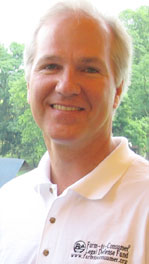The Farm-to-Consumer Legal Defense Fund’s (referred to here as the “Fund”) General Counsel Gary Cox provides updates on the cases he’s currently handling. Everyone represented in court by the Fund is a member of the organization.
Fund Represents George Vergote, Michigan Flower Grower, in Overspray Case
George Vergote owns and operates a multi-greenhouse operation and grows a large amount of flowers in Riga, Michigan. A chemical applicator sprayed chemicals that drifted into Mr. Vergote’s greenhouses and destroyed all of his flowers for the year. The Fund contacted the chemical applicator and their insurance carrier and attempted to reach a settlement without resorting to litigation. Our efforts at settlement, however, were rebuffed.
Consequently, a civil complaint for damages was filed on Mr. Vergote’s behalf in February 2015 claiming: (1) trespass, (2) negligence, (3) statutory negligence, and (4) res ispa loquitor (the thing speaks for itself). The case is at the initial stages. The parties have conducted some preliminary discovery, and Mr. Vergote had his deposition taken by the other side. Now that Mr. Vergote has testified under oath at his deposition, there may be a possibility of settlement.
Fund Defends Colorado Sheep Farmer Steve Keno
Steve Keno is a senior citizen with a foot disability who grazes sheep in Pagosa Springs, Colorado. The Aspen Springs Metropolitan District claims that Mr. Keno does not have permission to graze his sheep on their property. Mr. Keno claims that under Colorado’s “fence” law, the District must maintain a lawful fence if they want to keep out Mr. Keno’s sheep. In any event, Mr. Keno’s sheep do not even graze the District’s property; they simply walk over it on their way to graze on other property for which Mr. Keno has permission.
The trial court has issued an injunction prohibiting Mr. Keno’s sheep from grazing the District’s property and has ordered him to pay attorneys’ fees and court costs. The trial court’s rulings have been appealed to the Colorado Court of Appeals, arguing that as a creature of statute the District does not have the authority to prohibit somebody from grazing sheep. Also, the Fund is arguing that unless the District erects a lawful fence to keep Mr. Keno’s sheep from entering its property, Colorado’s fence law does not impose liability upon Mr. Keno. Finally, attorneys’ fees and court costs are not allowed under the facts of this case.
The parties have briefed the matter and have conducted oral argument before the Colorado Court of Appeals and are awaiting a ruling on the merits of the appeal.
Seibold Vineyard in Texas Victim of an Overspray Incident
Rebecca and Wesley Seibold are the owners and operators of six acres of grape vines in Texas. They produce three different varieties of grapes and sell the juice to winemakers who make wine from the juice.
The Seibolds were the victims of an overspray incident conducted by an aerial sprayer. The Fund has filed a civil action against the aerial spraying company and is claiming: (1) trespass, (2) negligence, (3) statutory negligence, and (4) res ispa loquitor (the thing speaks for itself). The case is at the initial stages.
The chemical applicator has filed an answer in response to the complaint and the parties have exchanged some initial discovery. Expert witnesses have been retained and depositions should commence in September.
Fund Argues Jackie Kerr Is Also Protected by Michigan’s Right to Farm Act
Jackie Kerr owns horses, a woodlot, and over nine acres of property in Michigan. She raises Cornish hens, sells the eggs and the hens, and also sells firewood, horses and manure from her property. The local Township brought a civil infraction against her, arguing she needed at least ten acres to keep horses and thus because she only had nine acres she had to stop her activities.
The Fund defended her at the hearing and introduced evidence that Ms. Kerr is making money from her farming operations and that MDARD has certified her to be in compliance with the “generally accepted agricultural management practices”(GAAMPs). The trial court, however, found that Ms. Kerr’s testimony that she was selling horses from her farm was not credible because she is a “lover of horses.” Thus, the court ruled that since her farm was not “commercial”, she did not enjoy the protection of the Right to Farm Act.
The Fund has appealed that order to the Circuit Court. The parties will now be required to file briefs and, if ordered, to attend an oral argument before the Circuit Court.
Virginia Oyster Farmer Anthony Bavuso Singled Out for Zoning Reclassification
Anthony Bavuso is an oyster farmer in Virginia along the Chesapeake Bay. Mr. Bavuso has been allowed to farm and cultivate his oysters under the local zoning ordinances; however, the Township Board of Supervisors recently decided to change his zoning designation to prevent him from continuing to engage in oyster farming operations.
Mr. Bavuso, who was represented by another attorney at the time, filed a suit against the Board of Supervisors claiming that their zoning re-designation was illegal. Mr. Bavuso subsequently has now asked the Fund to become involved in the case, and we are assessing the merits of his complaint and deciding whether other causes of action should be brought. The case remains pending before Circuit Court.
Before his property was rezoned, Mr. Bavuso filed a lawsuit against the Township supervisors claiming that the Virginia Right to Farm Act protected his right to engage in oyster farming on his property. Recently the same circuit court ruled in his favor on the right to farm issue. Thus, the Fund will be contacting the attorney for the Township Supervisors to see if he would be willing to settle the case, now that the court has ruled against the Supervisors in this other matter.
Slaughterhouse Wrongfully Withholds Meat from Ohio Member Neil Perin
Ohio member Neil Perin provides veal to a restaurant and private customers in Athens, Ohio. A local slaughterhouse used by Mr. Perin failed to return organ meat, did not return all of the meat he was entitled to, and refused to compensate him for the deficiencies. Mr. Perin put a stop payment on his check for payment, and the slaughterhouse sued Mr. Perin in small claims court. The slaughterhouse also claimed to Mr. Perin’s customers that his meat was tainted. Mr. Perin counter-claimed for slander.
Mr. Perin has asked the Fund to represent him in the small claims matter. The Fund will be representing Mr. Perin in an effort to settle the case. The Fund will gather the evidence on Mr. Perin’s behalf and will contact the attorney representing the slaughterhouse to see if that attorney wishes to engage in settlement discussions.
The case is important because local slaughterhouses sometimes have a monopoly, and thus can mistreat farmers who run the risk of losing the ability to having their animals slaughtered at a USDA inspected facility. The Fund hopes to put an end to this entity’s abusing and belligerent practices and to ensure that small-scale sustainably produced meat products can be marketed in a fair and cost effective manner.
North Dakota Member Glen Philbrick Receives Settlement in Overspray Case.
North Dakota member Glen Philbrick was the victim of spray drift, and due to the drift of chemicals, lost his crops of tomatoes, peppers, quinoa and amaranth. Mr. Philbrick lost over 4,000 pounds of tomatoes, 200 pounds of peppers, 4 pounds of amaranth and 42 pounds of quinoa, all of which he would have sold directly to consumers.
Mr. Philbrick tried to settle the matter with the insurance company who insured the chemical applicator, but he was not successful. Mr. Philbrick then sought representation from the Fund to settle his claims, and once the Fund got involved, the insurance company agreed to a settlement. Mr. Philbrick has now been compensated for his damages and has returned to growing crops and vegetables for direct sale to consumers.
This is the third time the Fund has settled an overspray/drift case on behalf of Fund members, and the Fund continues to represent other members in their efforts to recover their damages due to drift.
Did you miss previous case updates? Read them here.
YOUR FUND AT WORK
 Services provided by FTCLDF go beyond providing legal representation for members in court cases.
Services provided by FTCLDF go beyond providing legal representation for members in court cases.
Educational and Political Action Services also provide an avenue for FTCLDF to build grassroots activism to create the most favorable regulatory climate possible. In addition to advising on bill language, FTCLDF supports favorable legislation via action alerts, social media outreach, and the online petition service.
You can help FTCLDF by becoming a member or donating today.

 Anyone wanting to make a contribution to support the work of FTCLDF can make a donation online or send a check to:
Anyone wanting to make a contribution to support the work of FTCLDF can make a donation online or send a check to:
FTCLDF
8116 Arlington Blvd, # 263
Falls Church, VA 22042
Prefer to make a tax-deductible donation? Contact us by email at [email protected] or call 703-208-FARM (3276). Thanks for your support.
